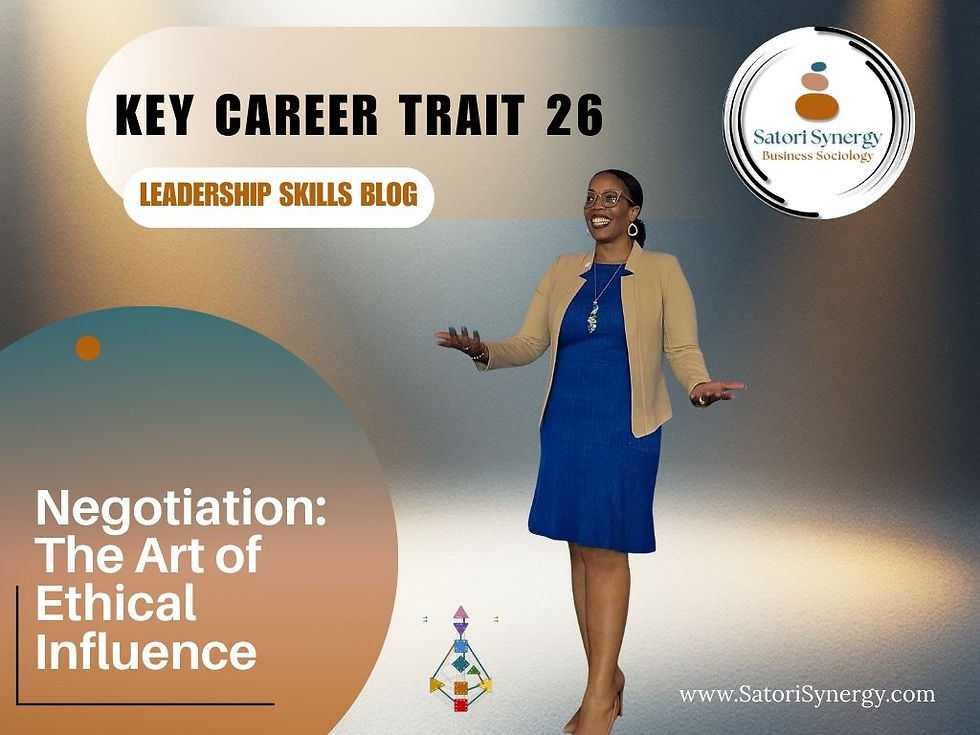Key Career Trait 23: THE TRANSLATOR
- Erica Hughey

- May 11
- 3 min read
Professionals who develop Key Career Trait 23 have the potential to thrive in roles where they can leverage their analytical abilities, insightful solutions and communication skills. This is the talent to translate complexity into simplicity in a manner that is beneficial for the team. As soon as you understand a concept, you can explain it in a way that makes it easy for others to grasp.

You have a special talent for deciphering complex topics and reducing them to the essentials. Your communication style is direct and convincing, which helps you reach others and gain support for your ideas. In meetings and discussions, you contribute to everyone quickly developing a clear understanding of the situation. You manage to present even difficult concepts in a way that makes them comprehensible to all. Your pragmatic communication style helps create a work environment where misunderstandings are avoided.
PROFESSIONAL DEVELOPMENT:
It’s critical when developing this career trait to ensure that your work aligns with the collective needs of the office. Your impact will be at its highest when you can use this skill to contribute to the organization’s progress and success.
To be most effective, wait until others are truly interested in hearing your transformative visions, that ensures your suggestions are taken seriously. Your ideas shine the brightest when presented in an appropriate context and invited. This prevents you from repeating yourself or providing unnecessary information. Patience and timing are key to ensuring your words receive the attention they deserve.
Stage 1: Validating. Begin to develop this trait by directing your attention to what truly needs it. Peeling away non-essential elements of your new vision reveals what is substantial to the task at hand. This lays the foundation for you to map out how to best assimilate what you have envisioned into your work environment.
Stage 2: Self-Defense. Notice how often do you find yourself blurting out, “I know”? That comes with the energy of this trait due to the spark of genius that suddenly falls upon you. In your excitement, others may find your knowing intolerable if you can’t defend it. Sit with your great idea for a while and allow it to fully develop first. Your coworkers will notice that something valuable to add and will ask your to share.

Stage 3: Uniqueness. Translating your inner vision so that your team can see what you see can be difficult. Here, it’s important to trust in your individuality while trying to connect the dots for others. Introducing new or innovative possibilities can lead to rejection initially as people can fear change even if its evolutionary such as the introduction of AI, remote work, etc.
Stage 4: Diversifying. To get your vision out so that it is accepted as a new project, you’ll need to fine refine it from how you see it in your mind into a way others can comprehend it. Practice how to express your knowing authentically and in a way demonstrates the company benefiting from it. You’ll need to be able to hear what you are saying and how it impacts, lands with others.
Stage 5: Acclimation. Here, your vision is mature enough that you are able to express it when asked in a tailored message with no ulterior motive. Be aware of the energetic pull for you to try to fit to have your solution incorporated. Continue to stand out by expressing your individuality as you wouldn’t want to lose your authenticity.
Stage 6: Synthesizing. Finally, in recognizing that there are more pieces to the puzzle you realize your vision by combining many different possibilities. Respond to pressure from the status quo by remaining neutral as your propose your new visions. Your unique viewpoint guides diverse options towards a unifying solution.
Satori Synergy offers holistic, data-driven, transformative career coaching and team building to change-ready professionals and organizations to cultivate successful work cultures and satisfying careers aligned with individual natural traits and strengths. Erica Hughey, a Career Analyst trained at the Human Design Business Institute, uses your Career Design Blueprint as an objective, individualized tool for tailored professional development, leadership training, talent management, and change management.
Get started by reading your personalized SOP, a Career Design Report or schedule an expert Career Design Analysis session to discover and discuss your prominent leadership traits. You'll learn how to leverage your innate skills to transform yourself and your work environment solving for communications issues by using your specific interaction strategies and authentic decision making.







